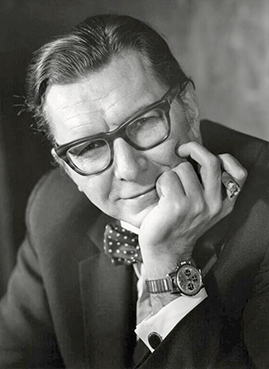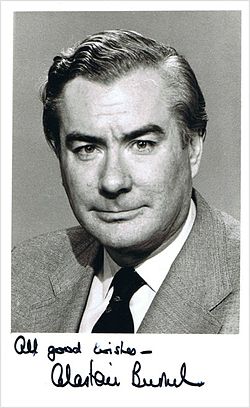
Constance Mary Whitehouse was a British teacher and conservative activist. She campaigned against social liberalism and the mainstream British media, both of which she accused of encouraging a more permissive society. She was the founder and first president of the National Viewers' and Listeners' Association, through which she led a longstanding campaign against the BBC. A hard-line social conservative, she was termed a reactionary by her socially liberal opponents. Her motivation derived from her Christian beliefs, her aversion to the rapid social and political changes in British society of the 1960s, and her work as a teacher of sex education.

Sir Robin Day was an English political journalist and television and radio broadcaster.

John Birt, Baron Birt is a British television executive and businessman. He is a former Director-General (1992–2000) of the BBC.

William Rees-Mogg, Baron Rees-Mogg was a British newspaper journalist who was Editor of The Times from 1967 to 1981. In the late 1970s, he served as High Sheriff of Somerset, and in the 1980s was Chairman of the Arts Council of Great Britain and Vice-Chairman of the BBC's Board of Governors. He was the father of the politicians Sir Jacob and Annunziata Rees-Mogg.
Sir Michael Checkland was Director-General of the BBC from 1987 to 1992, being appointed after the forced resignation of Alasdair Milne.
Alasdair David Gordon Milne was a British television producer and executive. He had a long career at the BBC, where he was eventually promoted to Director-General, and was described by The Independent as "one of the most original and talented programme-makers to emerge during television's formative years".
Sir James Ian Raley Trethowan was a British journalist, radio and television broadcaster and administrator who eventually became Director-General of the BBC from 1 October 1977 to 31 July 1982, having previously been managing director of BBC network radio from 1970 to 1976.

Sir Hugh Carleton Greene was a British television executive and journalist. He was director-general of the BBC from 1960 to 1969.
The Board of Governors of the BBC was the governing body of the British Broadcasting Corporation (BBC). It consisted of twelve people who together regulated the BBC and represented the interests of the public. It existed from 1927 until it was replaced by the BBC Trust on 1 January 2007.

David Dimbleby is an English journalist and former presenter of current affairs and political programmes, best known for having presented the BBC topical debate programme Question Time. He is the son of broadcaster Richard Dimbleby and elder brother of Jonathan Dimbleby, of the Dimbleby family. Long involved in the coverage of national events, Dimbleby hosted the BBC Election Night coverage from 1979 to 2017, as well as United States presidential elections on the BBC until 2016. He has also presented and narrated documentary series on architecture and history.
This article outlines, in chronological order, the various controversies surrounding or involving the BBC.

Sir James William Alexander Burnet, known as Alastair Burnet, was a British journalist and broadcaster, best known for his work in news and current affairs programmes, including a long career with ITN as chief presenter of the flagship News at Ten; Sir Robin Day described Burnet as "the booster rocket that put ITN into orbit".
Marmaduke James Hussey, Baron Hussey of North Bradley, known as Duke Hussey, was Chairman of the Board of Governors of the BBC from 1986 to 1996, serving two terms in that role.

The Falklands Play is a dramatic account of the political events leading up to, and including, the 1982 Falklands War. The play was written by Ian Curteis, an experienced writer who had started his television career in drama, but had increasingly come to specialise in dramatic reconstructions of history. It was originally commissioned by the BBC in 1983, for production and broadcast in 1986, but was subsequently shelved by Controller of BBC One Michael Grade due to its pro-Margaret Thatcher stance and alleged jingoistic tone. This prompted a press furore over media bias and censorship. The play was not staged until 2002, when it was broadcast in separate adaptations on BBC Television and Radio. It was aired again on BBC4, 1 December 2020, over 18 years after it was last transmitted.
Sir Nicholas Roger Kenyon, CBE, is a British music administrator, editor and writer on music.
Thomas Kelman Fleming, FRSAMD was a Scottish actor, director, and poet, and a television and radio commentator for the BBC.
Gerard Evelyn Herbert "Gerry" Mansell was a BBC executive, most famous for reorganising BBC Radio into Radio 2, 3 and 4 as controller of the BBC Home Service, and for a political conflict early in Margaret Thatcher's tenure as Prime Minister.
Stephen Hearst was an Austrian-born British television and radio executive.
Sir Nicolas Cheetham was a British diplomat and writer.
Margaret Elizabeth Douglas was an English television producer and executive for the BBC. She joined the BBC in 1951, as a secretary to the Panorama editor Michael Peacock in 1951. Douglas worked on the 1959 United Kingdom general election and was subsequently given the responsibility of covering the proceedings of party conferences at the BBC in 1972. She was appointed as chief assistant to the Director-General of the BBC Alasdair Milne in 1983 and was promoted to chief political advisor when his successor Michael Checkland took over from Milne four years later. Douglas decided to retire from the BBC in 1993 and became the Supervisor of Parliamentary Broadcasting at the Palace of Westminster, a post she held until 1999.








